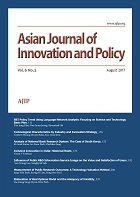Reflection and Challenge for Science and Technology Policy Studies in Korea
권기석 (한밭 대학교)
김은미 (충남대학교)
오현정 (한국전자통신연구원)
정서화 (한국행정연구원)
Abstract
We have identified the paradigm, the knowledge structure, and the roles of S&T policy studies in Korea by empirical analysis and focus group interviews. First, it provisionally concluded that S&T policy studies in Korea are still in the pre-paradigm stage. Specifically, the level of consensus among scholars about the “academic definition of discipline” and “research scope”, which is essential for an independent discipline, is still low. Next, a great part of the existing S&T policy studies in Korea is excessively weighted in specific research scopes and researcher groups. For a balanced development as an academic discipline, such imbalance must be overcome. Third, the studies in Korea showed that much of the research in the earlier stage was fragmented at the micro-level. More recently, however, S&T policy studies show co-evolutionary patterns, which increase the responsiveness of the society. Based on this analysis, the future direction of studies should form a unique flow of our own, building Korean policy cases and models rather than following those developed countries.
- keywords
- Science and technology policy, S&T policy studies, paradigm, role, knowledge structure
참고문헌
Choi, J.H., Kim, H.S. and Im, N.G. (2011) Keyword network analysis for technology forecasting, Journal of Intelligence and Information Systems, 17(4), 227-240.
Choi, S.S. (2011) Theory of Science and Technology Policy, Seoul: Sigmapress.
Hong, H.D. (2016) Theory of Science and Technology Policy: Governance Prospective, Seoul: Daeyoung Co.
Hyun, B.H., Yoon, J.H. and Seo, J.H. (2006) Theory of New Research and Development Planning, Seoul: Kyungmun Publishers.
Jeong, J.G., Choi, J.W., Lee, S.W., Jeong, J.G. and Jeong, G.H. (2010) Policy Sciences, Seoul: Daemyung.
Jeong, S.Y. (2006) Technology and Business Management, Seoul: Kyungmun Publishers.
Kim, E.M. and Yi, C.G. (2018) Research trend and knowledge structure of studies on science and technology policy, Journal of Korea Technology Innovation Society, 21(1), 33-63.
Kim, I.S. and Lee, J.J. (1982) Process and Policy of Technology Innovation, Seoul: Korea Development Institute.
Kim, J.B. (1993) Theory of Science and Technology Policy, Seoul: Daeyoung Co.
Kim, J.H. (2003) Economics of Technology Innovation, Seoul: Sigmapress.
Kwon, K.S., Jeong, S.H. and Yi, C.G. (2018) Science and technology policy, society, and state: an analysis of a co-evolution among social issue, governmental policy, and academic research in science and technology, Journal of Korea Technology Innovation Society, 21(1), 64-91.
Lee, G.J. (1990) Strategy of Technology Innovation, Seoul: Nanam.
Lee, G.R. (2000) Overview of Technology Innovation Theory, Seoul: STEPI.
Lee, J.J., Hyun, B.H. and Choi, Y.H. (2011) Science and Technology Policy: Phenomenon and Theory, Seoul: Kyungmun Publishers.
Lee, J.O., Lee, G.H., Jeong, S.Y., Cho, S.B. and Yoon. J.H. (2005) R&D Management, Seoul: Kyungmun Publishers.
Lee, W.Y. (2008) Economics of Technology Innovation, Seoul: Life and Power Press.
Lee, Y.D. and Jo, S.H. (2013) Technology Management, Seoul: Doonam.
Nam, S.H., Park, J.M. and Seol, S.S. (2005) Quantitative analysis of knowledge flow: technology innovation research in Korea, Journal of Korea Technology Innovation Society, 8 (Special ed.), 337-359.
National Institute of Korean Language (2016) Standard Korean Dictionary, http://stdweb2.korean.go.kr/search/List_ic.jsp (2016.12.20.).
Newman, M.E. and Girvan, M. (2004) Finding and evaluating community structure in networks, Physical Review E, 69(2), 1-16.
Park, H.W. and Loet, L. (2004) Understanding the KrKwic: a computer program for the analysis of Korean text, Journal of the Korean Data Analysis Society, 6(5), 1377-1387.
Park, W.H. et al. (2001) Studies on Technology Economics, Seoul: Snupress.
Park, Y.C. (1983) Diffusion Process of innovation, Seoul: Koreawon.
Seol, S.S. (2011) Technological Innovation, Seoul: Bummunsa.
Seol, S.S., Jo, M.H., Kim, S.T., Lee, G.H. and Lee, D.H. (1997) Technology innovation and industry, science and technology policy, Seoul: Industry Technology Research Institute.
Song, W.J. (2006) Technology Innovation and Science and Technology Policy, Seoul: Renaissance.
Yi, C.G. et al. (2018a) Discussion of the paradigm of studies on science and technology policy: suggesting the definition of discipline and research scope, Journal of Korea Technology Innovation Society, 21(1), 1-32.
Yi, C.G. et al. (2018b) Studies on Science and Technology Policy in Korea: Reflection and Challenge, Daejeon: Immanuel.
Yoon, J.H. (2006) Korea’s Theory of Technology Policy, Seoul: Kyungmoonsa.
- 다운로드 수
- 조회수
- 0KCI 피인용수
- 0WOS 피인용수


